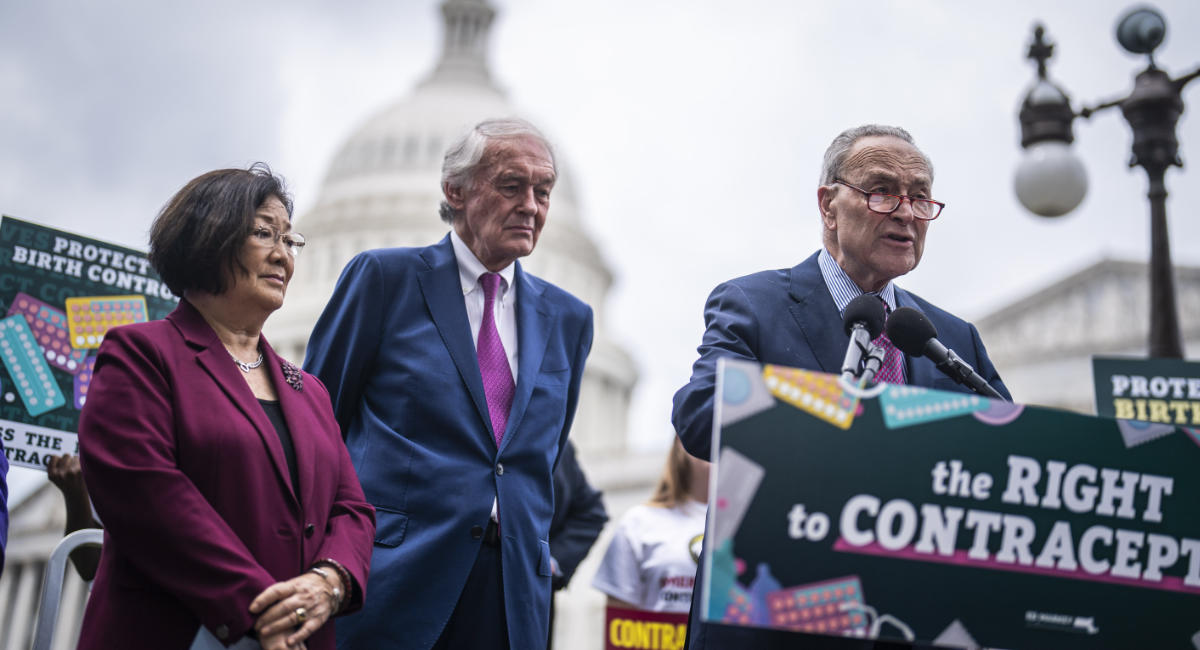Senate Republicans blocked a Democratic bill last week that would have established a “right” to contraception. And while their political opponents are using this as a way to make them seem unreasonable, opposing it was a wise decision.
Introduced by Sen. Ed Markey, S.4381, known as the Contraception Act, would “protect an individual’s ability to access contraceptives and to engage in contraception and [] protect a health care provider’s ability to provide contraceptives, contraception, and information related to contraception.” It failed to receive the 60 votes need to proceed, with 51 votes in favor and 39 against. The bill also states (emphasis added):
The purposes of this Act are—
(1) to provide a clear and comprehensive right to contraception;
(2) to permit individuals to seek and obtain contraceptives and engage in contraception, and to permit health care providers to facilitate that care; and
(3) to protect an individual’s ability to make decisions about their body, medical care, family, and life’s course, and thereby protect the individual’s ability to participate equally in the economic and social life of the United States.
The third purpose listed in the Act is highly suspect. Here’s why: Its vague references to “making decisions about [one’s] body,” “medical care,” “family,” and “participat[ing] equally in the economic… life of the United States” aren’t new. The same phrasing was part of a 2021 bill seeking to legalize abortion up to birth.
The Women’s Health Protection Act (WHPA) of 2021 stated (emphasis added): “Abortion services are essential health care and access to those services is central to people’s ability to participate equally in the economic and social life of the United States. Abortion access allows people who are pregnant to make their own decisions about their pregnancies, their families, and their lives.”
Note the strong similarities in wording between the two acts. It is also imperative to note that the pro-abortion American College of Obstetricians and Gynecologists (ACOG) has changed commonly accepted medical definitions used in the past to allow for a broader classification of contraceptives — including ones that are known or potential abortifacients. Could ACOG at some point decide to “redefine” other terms to broaden the definition of a “contraceptive” once again — perhaps this time to include drugs that definitively end a preborn child’s life after it has already implanted in the womb? It is naïve to think this outside the realm of possibility.
In addition to all of this, establishing a “right” to contraception holds a likelihood of forcing taxpayers to fund it and health care practitioners to prescribe it — even if they have religious objections to it. A coalition of 22 GOP lawmakers pointed out this threat to religious freedom, while also accusing the Democrats of trying to use a non-issue to push an agenda.
“There is no threat to access to contraception, which is legal in every state and required by law to be offered at no cost by health insurers, and it’s disgusting that Democrats are fearmongering on this important issue to score cheap political points,” said a coalition of 22 Republican lawmakers in a statement opposing the bill.
READ: UK survey: Half of women have ‘serious trouble’ with contraceptives
“This bill infringes on the parental rights and religious liberties of some Americans and lets the federal government force religious institutions and schools, even public elementary schools, to offer contraception like condoms to little kids,” they added. “It’s just another way for Democrats to use activist attorneys and our courts to advance their radical agenda and that is why we oppose this bill.”
A similar attempt at passage of a Contraception Act was made in 2022, after the Supreme Court issued its ruling in Dobbs v. Jackson Women’s Health Organization, which overturned Roe v. Wade. House Democrats at that time attempted to paint contraceptives as under threat by the Supreme Court due to a remark made by Justice Clarence Thomas in his concurring opinion. No other justices made an argument to revisit the 1965 decision forcing states to legalize contraception.
The Radiance Foundation, a pro-life organization, also warned that the bill was an attempt to eliminate religious freedom.
“Since the Dobbs ruling, Dems have been spreading fear about Republicans trying to end access to contraception. It’s a lie, but that never stops the Left,” the organization wrote in a Facebook post. “This bill, however, erases any and every church or religious organization/business’ right to NOT provide contraceptives (and abortifacients). It absolutely erases all state and federal laws regarding contraception including the Religious Freedom Restoration Act. It also allows orgs like Planned Parenthood to sue and collect for ‘damages.'”







